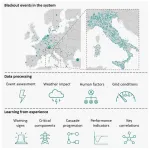(Press-News.org) New York, NY | October 18, 2023 – Two grants from the National Institute of Allergies and Infectious Diseases (NIAID), a four-year $3.2 million award and a 12-month $550,000 administrative supplement, will support innovative research to advance the understanding of how climate change and extreme weather influence HIV-related health outcomes around the world.
A multidisciplinary team of researchers from the CUNY Institute for Implementation Science in Population Health (CUNY ISPH) at the CUNY Graduate School of Public Health and Health Policy (CUNY SPH), the University of California, San Francisco (UCSF), the University of California, Santa Barbara (UCSB) and the Icahn School of Medicine at Mount Sinai will examine the effects of extreme weather events, such as heavy rainfall, hurricanes and drought on short and long-term outcomes of more than two million people living with HIV who have enrolled in HIV care at clinics in 44 countries around the world.
“Most of the 37 million people living with HIV are on treatment, which requires continuous access to antiretroviral medications both to ensure a normal life expectancy and prevent onward transmission of the virus,” says CUNY SPH Distinguished Professor of Epidemiology Dr. Denis Nash, executive director of CUNY ISPH and a principal investigator of both studies. “We know very little about the ways that extreme weather influences HIV outcomes and, by extension, its past and present influences on the trajectory of the HIV pandemic.”
“Drought and extreme rainfall threaten agricultural yields and pastoral conditions, increasing food insecurity, undernutrition, migration and infrastructure erosion,” says co-principal investigator Dr. Sheri D. Weiser, professor of medicine at UCSF and the director of the University of California’s Center for Climate, Health and Equity. “These climate-related factors likely also increase the risk of poor clinical outcomes among people living with HIV.”
Work on the four-year R01 award will combine data sources uniquely suited to characterize the influence of extreme weather on HIV care outcomes. The R01 will center on the global IeDEA cohort collaboration, which includes longitudinal data on more than two million people enrolling in HIV care since 2004 at more than 400 clinics in 44 countries. IeDEA data includes daily information on clinic visits, antiretroviral medication uptake and HIV-related laboratory tests that can be used to assess several key outcomes, including disruptions in HIV care and treatment, laboratory monitoring, HIV viral suppression and discontinuing care at a clinic.
The IeDEA cohort data will be combined with climate-related data sources, including high spatial resolution, daily data on temperature and rainfall data publicly available from UCSB’s Climate Hazards InfraRed Precipitation/Temperatures with Station Data (CHIRPS/CHIRTS), which is based on weather-related satellite imagery and weather station data. With these combined data sources, the team will conduct in-depth analyses to produce some of the first longitudinal studies of the impact of extreme weather on HIV outcomes over time.
“This is an important and novel application of some of UCSB’s flagship data resources,” says Dr. Frank Davenport, a co-investigator and associate researcher at UCSB’s Climate Hazards Center, which developed and curates CHRPS/CHIRTS.
The R01 project also includes a qualitative study among people living with HIV and key stakeholders in the Philippines and Rwanda – two countries vulnerable to and historically impacted by extreme weather events. The team will elucidate vulnerability and resilience factors as well as promising clinic and household adaptation strategies that are used in response to extreme weather events.
“This work will help provide important context and insights around the mechanisms by which extreme weather influences HIV outcomes, as well as approaches that are currently being used to adapt to climate change, both of which will be critical for our future work,” says Weiser.
“The HIV pandemic is heavily concentrated in geographic regions of the world that are also most vulnerable to the impacts of extreme weather, creating the prospect that climate change may be a significant barrier to the goal of ending HIV/AIDS as a public health threat,” says Dr. Andrew Maroko, director of the Geospatial Health Research Lab in the Institute for Health Equity Research at Icahn Mount Sinai. “Advances in spatial methods and geographic analysis have improved rapidly over the last few decades and are particularly well suited to this investigation. Because the study includes so many diverse geographic locations with data going back to 2004, we expect to gain insights about the specific types of locations where people living with HIV are most susceptible to specific types of extreme weather events.”
With the 12-month administrative supplement to the NIH-funded Central Africa IeDEA project (U01AI096299, MPIs Nash, Anastos, Yotebieng), the CUNY team will create a new Climate and Health Scientific Interest Group (SIG) within the global IeDEA network. Many critical HIV care outcomes that are the focus of IeDEA’s research, such as gaps in care, engagement in care, loss to care, viral suppression and drug resistance, remain unexplained by the universe of data currently collected within IeDEA. The new Climate and Health SIG within IeDEA will be a way to engage, share knowledge and support those among the 500+ investigators in the IeDEA network who also have an interest in climate and health research.
The project will also develop climate-related data resources specific to IeDEA to facilitate climate and health-focused research.
“We are trying to create a new research frontier within the IeDEA network focused on climate and HIV outcomes, which has further relevance for the larger group of IeDEA-engaged stakeholders, such as WHO, UNAIDS and PEPFAR, as well as for other health outcomes beyond HIV/AIDS,” says Nash.
The few studies on the topic have suggested that extreme weather has a negative impact on exposures and HIV outcomes; however, most have been cross-sectional. Findings from the work of these new projects will leverage longitudinal data over a period of decades, which will better characterize true causal relationships. This, in turn, can inform strategies to help mitigate the impacts of climate change and extreme weather on HIV care outcomes and the trajectory of the HIV pandemic. The team also expects that the work will be relevant for other chronic health conditions that require continuous access to care and medications, such as hypertension and diabetes.
The team is currently recruiting for a full-time Postdoctoral Fellow to focus on climate and health research, as well as a full-time Project Manager, to join the project team.
For media inquiries, contact:
Ariana Costakes
Communications Editorial Manager
ariana.costakes@sph.cuny.edu
About CUNY SPH
The CUNY Graduate School of Public Health and Health Policy (CUNY SPH) is committed to promoting and sustaining healthier populations in New York City and around the world through excellence in education, research and service in public health and by advocating for sound policy and practice to advance social justice and improve health outcomes for all. sph.cuny.edu
About the CUNY ISPH
The CUNY Institute for Implementation Science in Population Health (CUNY ISPH) was founded on the notion that substantial improvements in population health can be efficiently achieved through better implementation of existing strategies, policies, and interventions across multiple sectors. With that in mind, we study how to translate and scale up evidence-based interventions and policies within clinical and community settings in order to improve population health and reduce health disparities. The CUNY ISPH is also part of the NIH funded Einstein, Rockefeller, CUNY Center for AIDS Research.
About UCSF
The University of California, San Francisco (UCSF) is exclusively focused on the health sciences and is dedicated to promoting health worldwide through advanced biomedical research, graduate-level education in the life sciences and health professions, and excellence in patient care. It includes UCSF Health, which comprises three top-ranked hospitals, as well as affiliations throughout the Bay Area. Learn more at https://www.ucsf.edu.
About UCSB
The UCSB Climate Hazards Center, housed within the University Geography Department, is an alliance of multidisciplinary scientists utilizing climate and crop models, satellite-based earth observations, and socioeconomic data sets to predict and monitor droughts, food security, and health outcomes among the world’s most vulnerable populations. Through partnerships with USAID, USGS, and the Famine Early Warning System Network (FEWS NET), the CHC provides early warning to save lives and secure livelihoods.
About the Mount Sinai Health System
Mount Sinai Health System is one of the largest academic medical systems in the New York metro area, with more than 43,000 employees working across eight hospitals, over 400 outpatient practices, nearly 300 labs, a school of nursing, and a leading school of medicine and graduate education. Mount Sinai advances health for all people, everywhere, by taking on the most complex health care challenges of our time — discovering and applying new scientific learning and knowledge; developing safer, more effective treatments; educating the next generation of medical leaders and innovators; and supporting local communities by delivering high-quality care to all who need it. For more information, visit https://www.mountsinai.org or find Mount Sinai on Facebook, Twitter and YouTube.
END
Over $3.7 million in NIH grants will fund research on impacts of climate change on HIV-related health outcomes
2023-10-18
ELSE PRESS RELEASES FROM THIS DATE:
Clinical Quality Registries revolutionize clinical research and healthcare in Intensive Care Units
2023-10-18
Recently published in the scientific journal Critical Care Medicine, a review led by the D’Or Institute for Research and Education (IDOR) shed light on the importance of clinical quality registries (CQRs) for the healthcare sector. Also known as electronic medical records, CQRs are systems for collecting and storing health information related to patients and their treatments. The publication includes the collaboration of 15 countries' institutions and shows how the qualified collection of clinical and administrative information has been relevant for optimizing healthcare and management in intensive care units ...
Researchers developing ‘revolutionary’ multi-material for light-based 3D printing
2023-10-18
AMES, Iowa – The U.S. National Science Foundation (NSF) is looking for materials that “revolutionize and engineer our future.”
Researchers at Iowa State University and the University of California, Santa Barbara think they can do just that by fundamentally changing Digital Light Processing – a type of 3D printing that users light rather than heat to quickly cure and harden liquid resin into plastic layers – to enable multi-material printing.
“We want to produce two material properties ...
New institute aims to address gap in nation’s health care system through highly effective yet overlooked nutrition interventions
2023-10-18
A newly launched, first-of-its-kind institute aims to address a glaring gap in the medical system by working to integrate food-based nutrition interventions into health care to treat disease and advance health equity.
The Food is Medicine Institute at the Friedman School of Nutrition Science and Policy at Tufts University, launched today, establishes a university-wide initiative aimed at transforming health care through scalable food-based interventions such as: medically tailored meals and prescriptions for produce; nutrition education for doctors; and clinical care, electronic health record, and reimbursement pathways for nutrition-based tools to help treat or prevent ...
Wyss Institute at Harvard University wins BARDA contract to leverage human Organ Chips to advance knowledge and drug-discovery for broad range of health security threats
2023-10-18
By Benjamin Boettner
(BOSTON) — The Biomedical Advanced Research and Development Authority (BARDA), part of the Administration for Strategic Preparedness and Response (ASPR) at the U.S. Department of Health and Human Services (HHS), partnered with the Wyss Institute at Harvard University to support the Institute in advancing its human Organ Chip platform and drug discovery capabilities to better understand the illness and injuries that result from a broad range of health security threats, including high doses of radiation, as well as predicting and evaluating ...
Google Quantum AI and Stanford University researchers use measurements to generate quantum entanglement and teleportation
2023-10-18
Quantum mechanics is full of weird phenomena, but perhaps none as weird as the role measurement plays in the theory. Since a measurement tends to destroy the “quantumness” of a system, it seems to be the mysterious link between the quantum and classical world. And in a large system of quantum bits of information, known as “qubits,” the effect of measurements can induce dramatically new behavior, even driving the emergence of entirely new phases of quantum information.
This happens when two competing effects come to a head: interactions and measurement. In a quantum system, when the qubits interact ...
Cedars-Sinai uses AI to identify people with abnormal heart rhythms
2023-10-18
Investigators from the Smidt Heart Institute at Cedars-Sinai found that an artificial intelligence (AI) algorithm can detect an abnormal heart rhythm in people not yet showing symptoms.
The algorithm, which identified hidden signals in common medical diagnostic testing, may help doctors better prevent strokes and other cardiovascular complications in people with atrial fibrillation—the most common type of heart rhythm disorder.
Previously developed algorithms have been primarily used in white ...
How to build greener data centers? Scientists say crank up the heat
2023-10-18
Colder is not always better for energy-hungry data centers, especially when it comes to their power bills. A new analysis says that keeping the centers at 41°C, or around 105°F, could save up to 56% in cooling costs worldwide. The study, publishing October 10 in the journal Cell Reports Physical Science, proposes new temperature guidelines that may help develop and manage more efficient data centers and IT servers in the future.
“The cooling system accounts for over one-third of the data center’s total energy consumption, so many studies ...
As surging threats teeter electrical power grids, scientists offer insights to make them more resilient
2023-10-18
Power grids—the web of electrical networks that sprawl across countries and continents—are under stress. Extreme weather events and volatile energy demands often push the system to the brink. Although these high-impact events can be very damaging, often overlooked is the impact of minor disruptions that trigger a domino effect throughout the system, according to a study analyzing European power blackouts. The findings, published October 18 in the journal Joule, showed that recovering power within 13 hours can reduce up to ...
Telehealth supports retention in treatment for opioid use disorder
2023-10-18
Starting buprenorphine treatment for opioid use disorder through telehealth was associated with an increased likelihood of staying in treatment longer compared to starting treatment in a non-telehealth setting, according to a new study analyzing Medicaid data from 2019-2020 in Kentucky and Ohio. Published in JAMA Network Open, these findings add to a growing body of evidence demonstrating positive outcomes associated with the use of telemedicine for treatment of opioid use disorder.
In Kentucky, 48% of those who started buprenorphine treatment via telehealth remained in treatment for 90 continuous days, compared ...
Researchers design gene therapy that can effectively target glioblastoma
2023-10-18
In a first-in-human phase 1 trial in 41 patients with recurrent glioblastoma, an oncolytic virus treatment designed by Brigham researchers extended survival, especially among those with pre-existing viral antibodies
Therapy turns ‘immune desert’ into inflammatory cancer-fighting zone
Study demonstrated the safety and preliminary efficacy of a novel gene therapy for glioblastoma
Glioblastoma (GBM), an aggressive brain cancer, is notoriously resistant to treatment, with recurrent GBM associated with survival of less than 10 months. Immunotherapies, ...





